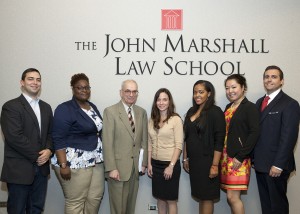
Professor Michael Seng (third from left) stands with students who participated in the year-long housing study. From left: Ralph Melbourne; Joi Lyons, project manager; Amber Madden, IDHR representative; Myka Bell; Victoria Yan; and Anthony Pasquini. Students not pictured: John Antia, Neda Brisport, Vishal Chhabria, Natasha Jackson, Rachel Kurz.
A team of students from The John Marshall Law School spent a year studying discrimination against specific classes and finds that major impediments are preventing strong enforcement of fair housing laws. The report was prepared for the Illinois Department of Human Rights.
Housing discrimination still plagues certain populations pushed into limited housing stock, according to findings in a new study on segregation in the Chicago area.
“Segregation in the Chicago Metropolitan Area—Some Immediate Measures to Reverse This Impediment to Fair Housing” a year-long study, was compiled by The John Marshall Law School Fair Housing Legal Support Center. The study was prepared for the Illinois Department of Human Rights (IDHR) and funded by the U.S. Department of Housing and Urban Development.
The findings were made public today, June 10, 2013, at a press conference at the law school.
In requesting the study, IDHR’s goal was to carry out a thorough examination of the housing landscape in the Chicago region—in light of the historic foreclosure crisis the country is now emerging from—and to identify concrete measures that have to the potential to affirmatively further fair housing in the Chicago metropolitan region.
“What we found is that specific groups face greater hurdles at finding decent housing, and part of the reason is that major impediments exist,” said Professor Michael P. Seng, director of the Fair Housing Legal Support Center.
“The John Marshall Law School has been working to end housing discrimination since the 1980s when the law school first partnered with the Leadership Council of Metropolitan Open Communities. While there’s been progress, it is unfortunate that we still find a pattern of discrimination being repeated. We now have new classes facing limitations in their housing choices,” Seng said.
“We hope that through these findings we can encourage government leaders to strengthen laws that are either not explicit or passive in their approach. Without coordination between government agencies or without specific guidelines, these patterns of discrimination will continue,” he added.
Chicago was the primary study area, but researchers for the Fair Housing Legal Support Center also looked at the Chicago suburban communities of Oak Park, Arlington Heights and Skokie.
The study starts with a short history of housing segregation in Chicago, and continues with a look at the impact of the 2008 mortgage foreclosure crisis and housing rules in place in Chicago, Cook County and its surrounding suburbs. The study also examines how discrimination directly impacts those with Housing Choice Vouchers (formerly Section 8); criminal records; marital status; the immigrant population and those with limited English proficiency; the lesbian, gay, bisexual and transgendered (LGBT) populations, especially youth of color; and senior citizens.
The team also presents procedural and administrative changes that could improve enforcement of fair housing laws and encourage those being discriminated to file complaints.
The full report can be viewed at https://www.jmls.edu/fairhousing/resources.php.
For additional information, contact Ciara Shook in the Public Relations Office, at 312.427.2737 ext. 554.

